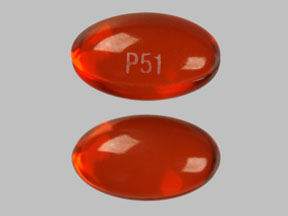
Stool Softener Coupons & Savings Card – Discount Prices from $4.55
Brand for: Docusate calcium
This medication is used to treat occasional constipation. Some medications and conditions can make constipation more likely. Stool softeners such as docusate are often the first method used for preventing and treating this type of constipation. Docusate is often used when straining to have a bowel movement should be avoided (such as after a heart attack or surgery). Docusate is a stool softener. It works by increasing the amount of water the stool absorbs in the gut, making the stool softer and easier to pass. Relief is usually seen in 1 to 3 days with this medication. Check the ingredients on the label even if you have used the product before. The manufacturer may have changed the ingredients. Also, products with similar names may contain different ingredients meant for different purposes. Taking the wrong product could harm you.
Our Stool Softener coupons are free to use. You can print the coupon, email it to yourself, or receive the Stool Softener coupon via text message. To get your free discount, show the pharmacist your Stool Softener savings card which has the discounted coupon price. Use our filters below to edit the prescription box to match your needs. The Stool Softener prices will update based on your prescription needs. Above our Stool Softener coupons, you can change the location to see pharmacy prices in other areas. Our prescription discount card will update online with the specific pharmacy costs associated with your edits. Be sure to text, email, or print the Stool Softener savings card code that you need after editing the prescription box and location field. Show the discount card to your pharmacist before paying.
My prescription
Edit
100MG, Docusate Sodium (60 Capsules)
Select pharmacy

Albertsons
$4.55
COUPON PRICE
Walgreens
$4.55
COUPON PRICEStool Softener savings card
Show this card to your pharmacist
Albertsons
$4.55
BIN
ID
PCN
GRP
011867
LH88025A09
HT
LABH001
Powered by
This medication is used to treat occasional constipation. Some medications and conditions can make constipation more likely. Stool softeners such as docusate are often the first method used for preventing and treating this type of constipation. Docusate is often used when straining to have a bowel movement should be avoided (such as after a heart attack or surgery). Docusate is a stool softener. It works by increasing the amount of water the stool absorbs in the gut, making the stool softer and easier to pass. Relief is usually seen in 1 to 3 days with this medication. Check the ingredients on the label even if you have used the product before. The manufacturer may have changed the ingredients. Also, products with similar names may contain different ingredients meant for different purposes. Taking the wrong product could harm you.
Our Stool Softener coupons are free to use. You can print the coupon, email it to yourself, or receive the Stool Softener coupon via text message. To get your free discount, show the pharmacist your Stool Softener savings card which has the discounted coupon price. Use our filters below to edit the prescription box to match your needs. The Stool Softener prices will update based on your prescription needs. Above our Stool Softener coupons, you can change the location to see pharmacy prices in other areas. Our prescription discount card will update online with the specific pharmacy costs associated with your edits. Be sure to text, email, or print the Stool Softener savings card code that you need after editing the prescription box and location field. Show the discount card to your pharmacist before paying.
Stool Softener FAQs
Using the SaveHealth discount card, what is the price of Stool Softener without insurance?
Using the SaveHealth discount card, the price of Stool Softener without insurance is $4.55.
What is the price of Stool Softener at Walgreens?
The price of Stool Softener at Walgreens is $4.55.
